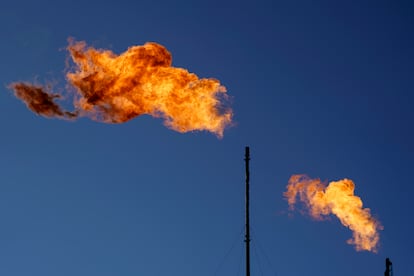US and European oil giants doubled their profits in 2022
Exxon, Chevron, Shell, BP and TotalEnergies made a combined net income of nearly $200 billion. The year of the Ukraine war was their best year in history

Fossil giants are cashing in on the global turbulence. The five largest Western oil companies – the US firms ExxonMobil and Chevron, the Anglo-Dutch Shell, the British BP and the French TotalEnergies – logged a combined net profit of more than $196 billion (€183 billion) in 2022. That is twice as much as in 2021, when prices had already begun to rise, and 50% more than their record earnings during the final stretch of the raw materials supercycle – a sustained period of expansion driven by strong growth. The year of the Ukraine war and the energy crisis was also the best year in history for the oil majors’ bottom line.
There have been many tailwinds blowing in favor of these companies. Oil exploration and production, normally the most profitable side of the business, benefited from a surge in the price of crude, which reached close to $130, a figure unseen in more than a decade. And refining, traditionally less lucrative, did well in an environment of recovering demand coupled with a supply constrained by sanctions on Russia.
I would not be surprised to see $100 a barrel coming backTotalEnergies CEO Patrick Pouyanné
This avalanche of money is making itself felt on all fronts. The debt of the five major Western oil companies closed last year at less than half what it was in 2020, the year of the Covid-19 pandemic. Shareholder remuneration skyrocketed in two ways: record dividends – half of the profits were distributed – and record share repurchases that raised the value of the stock that remains in circulation.
In addition, in the midst of a transition to renewable energy – for the first time, the world is investing as much money to replace fossil fuels as it is to produce oil, gas, and coal, according to a BloombergNEF analysis – oil companies, especially European ones, are doubling down on their investments in wind, solar photovoltaic and green hydrogen.
Rising shares
Energy companies have been the counterpoint to the hardships of the stock markets since the beginning of the war. The 10 US listed companies that performed the best in 2022 operate in that sector. And 10% of the total profits of the S&P500 – the main index of the US stock market – comes from oil and gas companies according to Bloomberg data, despite the fact that these account for only 5% of the total market value.
In this scenario, public calls for more taxes on windfall profits have been gaining traction. In recent months, the European Commission has endorsed this formula and several countries – including Spain, Italy and the United Kingdom – have unilaterally taken some steps in this direction. On the other side of the Atlantic, US President Joe Biden dedicated a section of his State of the Union address to launching a powerful invective against the oil giants: “They invested too little of that profit to increase domestic production and keep gas prices down,” Biden said. “Instead, they used those record profits to buy back their own stock, rewarding their CEOs and shareholders.” The president called this attitude “outrageous.”
Favorable prospects
In the short and medium term, the prospects for the oil giants remain very favorable. It is true that, despite the efforts of OPEC, the group of oil exporting countries, the price of crude oil has dropped by 40% from the highs of March, a few days after the first Russian troops crossed the border into Ukraine. It is also true that natural gas, another powerful source of income, has fallen in price by more than 80% in Europe since the peak in August. But the fundamentals have barely changed: the bottleneck at refineries is still there, aggravated by recent European sanctions on Russian diesel, and demand remains strong, especially after the recent reopening of the Chinese economy and with fears of a recession growing dimmer.
“I would not be surprised to see $100 a barrel coming back,” said TotalEnergies CEO Patrick Pouyanné on Wednesday at the presentation of the French company’s 2022 results. “If China’s consumption continues to increase, as expected, and the Russian supply of crude oil and derivatives continues to fall, the markets will tighten significantly,” added experts at the Eurasia risk consultancy in a recent note for clients. And a tight market is the best fertilizer for the flourishing of income statements of the oil companies.
Sign up for our weekly newsletter to get more English-language news coverage from EL PAÍS USA Edition
Tu suscripción se está usando en otro dispositivo
¿Quieres añadir otro usuario a tu suscripción?
Si continúas leyendo en este dispositivo, no se podrá leer en el otro.
FlechaTu suscripción se está usando en otro dispositivo y solo puedes acceder a EL PAÍS desde un dispositivo a la vez.
Si quieres compartir tu cuenta, cambia tu suscripción a la modalidad Premium, así podrás añadir otro usuario. Cada uno accederá con su propia cuenta de email, lo que os permitirá personalizar vuestra experiencia en EL PAÍS.
¿Tienes una suscripción de empresa? Accede aquí para contratar más cuentas.
En el caso de no saber quién está usando tu cuenta, te recomendamos cambiar tu contraseña aquí.
Si decides continuar compartiendo tu cuenta, este mensaje se mostrará en tu dispositivo y en el de la otra persona que está usando tu cuenta de forma indefinida, afectando a tu experiencia de lectura. Puedes consultar aquí los términos y condiciones de la suscripción digital.









































